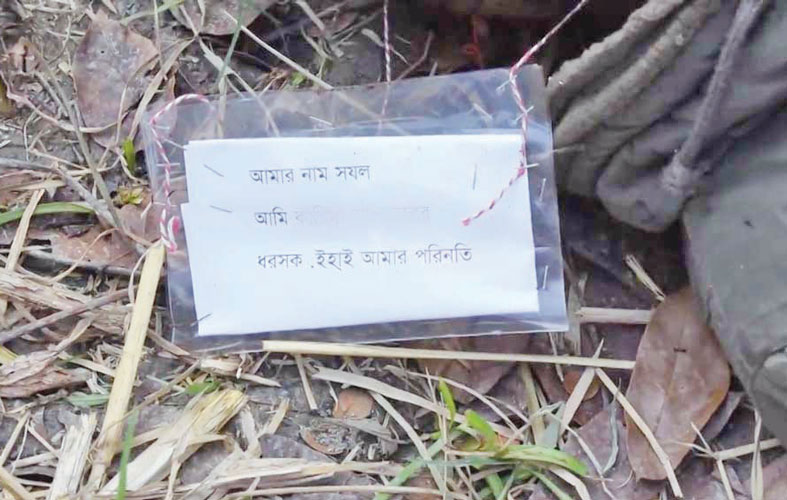
These killings began on January 18 where the prime accused of a rape case, Ripon, was found dead in Savar with his body carrying a note: ‘I am the main culprit behind the rape’
At least three persons charged in rape cases have been killed in the same strange manner within a span of two weeks across the country. The police however, have no clue as to why or how these murders have taken place.
They were all found shot in the head with notes attached to their necks that claimed their involvement in the rapes.
Another suspect of a rape case was killed in a crossfire with police.
These killings began on January 18 where the prime accused of a rape case, Ripon, was found dead in Savar with his body carrying a note: “I am the main culprit behind the rape.”
A week later, on January 26, police in Jhalakathi recovered the body of a youth named Sajal Jomaddar who was one of the suspects in a rape case. A similar note was attached to his neck.
In the latest incident, police on Friday recovered the body of the second suspect of the same case, Rakib Molla. This time the note was signed with the name Hercules.
On January 28, an accused in a gang-rape case was killed in a “gunfight” with police.
Although cases of mob lynching of suspected criminals are common in Bangladesh, these kinds of murders are a completely new phenomena.
Public reaction has been mixed, with many hailing this as vigilante justice. However, rights groups and activists have raised concerns, saying the death of suspects without trial or due process is a threat to the rule of law.
Human rights defenders said it is a matter of serious concern where the government needs to act immediately to restore the confidence of people in law and order.
They said the incidents are reflections of a culture of hatred among citizens which may have arisen because of lack of speedy and exemplary punishment of the accused behind serious crimes such as rape.
No investigation into the killings yet
Police officials concerned said they have not launched any specific investigations into these identical killings.
When the body of Sajal was found, Kathalia Police Officer-in-Charge, Enamul Haque, said they were clueless about the incident.
Md Jahid Hossain, officer-in-charge of Rajapur Police Station in Jhalakathi, said no cases have been lodged in this connection and they will only investigate if a case is filed.
Rezaul Haque, officer-in-charge of Ashulia Police Station, said they are not launching any investigation into the killing of Ripon.
Rakib Molla’s family members said he was missing for seven days before being found dead.
When the rape allegation surfaced, Rakib left his home at Bhitabaria for Dhaka and was staying with a friend in Savar, according to his father.
Rakib and his friend were picked up by some unidentified men, who came with a black and white microbus on January 25 from a place close to Gana Bishwabidyalaya in the evening. Although his friend returned, Rakib remained missing, he said.
On January 26, Rakib’s mother went to Ashulia police station to file a general diary, but it was not registered, she said.
’State cannot avoid responsibility’
For rights activist Nur Khan Liton, the incidents are a result of a culture of hatred, lawlessness, and fear.
“When extrajudicial killings began in Bangladesh a decade ago, law enforcement officials used to put adjectives to the names of criminals, which helped fuel public anger against these people,” he said.
“The last four incidents where rape suspects were murdered in a similar fashion leads us to believe that some strong and organized quarter is playing a key role behind the incidents” said Liton, a former director of Ain O Salish Kendra.
According to him, the bodies and the mode of the killings clearly show that some group is capitalizing on the frustration of the people by choosing a shortcut method to execute the killings and bring comfort to people’s minds.
“But the state cannot avoid the responsibility of such killings. All the cases must be investigated to find out who is behind them,” he added.
National Human Rights Commission Chairman Reazul Haque said these murders are the result of a lack of patience and the degradation of morality in society.
“These incidents hurt the faith of people in the rule of law in the country, which in the long run may result in lawlessness,” he said.
Stressing the need for more social awareness, he said the government needs to take initiatives for the completion of trials in rape cases in the shortest time possible, and ensure punishment of criminals so that people come to believe that criminals cannot walk away after committing a crime.
Former law minister, Barrister Shafique Ahmed, urged the government to launch an immediate investigation to find out why this is happening and who is behind the killings.
Rights group Ain o Salish Kendra on Jan 27 issued a statement demanding proper investigation into two incidents (held before Jan 27) where two young men accused in recent rape incidents were found shot dead.
“These kinds of extrajudicial killings give the wrong message to society and undermine the people’s faith in law enforcement, the rule of law, the judiciary and the state, which is never good for the nation,” it said.
Violence against women and children is continuing in Bangladesh at an alarming rate. 732 women and 444 children were raped in 2018, according to ASK data.
Extra judicial killings across Bangladesh also reached the highest in the same year compared to the past six years, with 466 killed in 2018.
Source: Dhaka Tribune.

